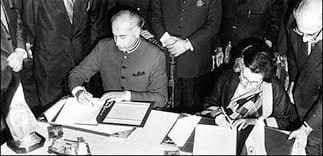
Suspending or ending the Shimla Agreement could have some interesting upsides for India, though it’s not a decision to take lightly. Depending on the bigger picture and what India’s goals are, there are a few ways this move could work in its favor.
1. Bilateral Control Over Kashmir
The Shimla Agreement, signed back in 1972, set the stage for resolving the Kashmir issue through direct talks between India and Pakistan. If India were to pull out of it, the entire dispute could be kept between the two nations, without any outside interference—like the UN or any other third parties. This could give India more say in how things unfold without having to respond to outside pressure or mediation efforts.
2. Stronger Stance on Sovereignty
Suspending the Shimla Agreement would be a powerful statement of India’s position on Kashmir. The agreement called for peaceful resolution, but India could argue that the situation has shifted over the years and that its sovereignty over Kashmir is no longer up for discussion. In essence, it could be a way for India to further consolidate its international standing as the legitimate authority in the region, putting to rest any external claims from Pakistan.
3. No Need for Third-Party Mediation
Under the Shimla Agreement, both countries agreed to sort out their issues bilaterally, but India might feel that Pakistan has often turned to international forums like the UN to intervene. If India suspends the agreement, it could argue that it no longer needs to entertain outside involvement. That could limit Pakistan’s diplomatic wiggle room, as they wouldn’t be able to appeal to international bodies for support.
4. Focus on Internal Development
Suspending the agreement could also give India the freedom to focus more on Kashmir’s internal development—things like building infrastructure, improving security, and working on governance—without being constantly bogged down by territorial disputes. This could be particularly important after the revocation of Article 370 in 2019. With less international scrutiny, India might feel more empowered to strengthen Kashmir’s integration with the rest of the country.
5. Diplomatic Leverage in Future Talks
While it could stir up tension at first, suspending the Shimla Agreement might give India more leverage in future discussions with Pakistan or international actors. India could argue that any peace talks moving forward should be based on current realities, not a decades-old agreement. This would let India set the terms of the conversation and assert its priorities more clearly.
6. Shifting Geopolitical Influence
Another strategic benefit could be the shift in the regional power balance. If India moves away from the Shimla Agreement, it might be able to push Pakistan into a more isolated position diplomatically. This could weaken Pakistan’s standing in international forums and tilt the balance in India’s favor. India’s influence could grow in the region, especially in its dealings with neighboring countries and global powers.
7. Security Concerns
The suspension might also be a response to ongoing security threats, especially given the history of cross-border terrorism from Pakistan. If India feels that the Shimla Agreement has not effectively addressed these issues, it could use this as a reason to adopt a more robust stance, both militarily and politically, in securing its borders and defending its interests.
8. Room for Unilateral Action
Suspending the Shimla Agreement could give India the flexibility to take more unilateral actions in Kashmir without the constraints of the 1972 framework. For instance, India could potentially change political or administrative structures in the region without facing accusations of violating the agreement. Given recent moves like the revocation of Article 370, this could provide even more room for India to shape the future of Kashmir without being tied to the past.





